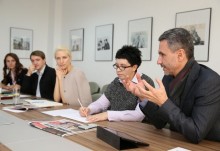This roundtable, laconically named “Elections,” is one of the series of meetings with public activists, now young politicians, under the general title of “Euromaidan,” which Den launched last December.
To discuss the early parliamentary elections as a chance to effect changes, for which the Maidan came out, and the ability of young politicians to make use of this chance, we invited Hanna HOPKO, cofounder of the Reanimation Package of Reforms initiative, No.1 on the Samopomich (Self-Help) party list; Svitlana ZALISHCHUK, cofounder of the Chesno (Honestly) movement, Petro Poroshenko Bloc parliamentary candidate; Hennadii DRUZENKO, political writer, law exert, Syla Liudei (People’s Strength) party parliamentary candidate; Oleksandr SOLONTAI, expert at the Institute of Political Education, Syla Liudei parliamentary candidate; and, as a “referee,” political consultant Viktoria PODHORNA. The first question we asked our guests to answer was: “Why did Euromaidan participants, who had shown themselves as public opinion leaders, fail to join their efforts for the coming parliamentary elections?” For an honest answer to this question means a chance for evolution.
WHY DID WE FAIL TO GO TO THE POLLS TOGETHER?
Svitlana ZALISHCHUK: “We position ourselves as a Trojan horse in the president’s party…”
 Larysa IVSHYNA: “And do they, ‘poor creatures,’ know this?”
Larysa IVSHYNA: “And do they, ‘poor creatures,’ know this?”
S.Z.: “They know this because we have frankly discussed this.
“But, coming back to your question, I will say that the answer to it should be sought in a broader social context of changes, on which we must also ponder. What has the Euromaidan changed? It has changed the paradigm of social relations.
“But – I agree with the way you formulated your question – social mobilization should lead to political institutionalization (according to Francis Fukuyama). Otherwise there will be a reverse process: energy will begin to abate and society to degrade. One of the Euromaidan’s greatest faults was that it failed to form this kind of a united political force.
“Why did this not happen? The first aspect is that Ukrainian politics still abides by old rules. Why are the Volia and Syla Liudei parties, as well as the Democratic Alliance, unable to win the elections together? We have discussed this matter. We’ve been holding meetings for eight months in an attempt to understand this. The first and foremost reason is that old rules are still being applied: there is a proportional system, but there are no open lists on which young people could be put in spite of the will of political leaders. We cannot compete with their TV channels. All TV channels in Ukraine are owned by certain political forces.
“This new Euromaidan force has not in fact been formed yet. And it will only be partially represented through other political forces in parliament.”
L.I.: “Oleksandr, what is your vision?”
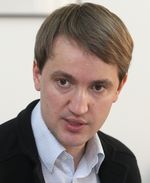 Oleksandr SOLONTAI: “I think there are some more factors in addition to the election rules (and I agree to this, for we are saying we’ve managed to form a united political force in the contest of elections, not just in general), for it is the current MPs who wrote these rules in order to be reelected to the new parliament and thus pretend to meet the demand for a renewed government.
Oleksandr SOLONTAI: “I think there are some more factors in addition to the election rules (and I agree to this, for we are saying we’ve managed to form a united political force in the contest of elections, not just in general), for it is the current MPs who wrote these rules in order to be reelected to the new parliament and thus pretend to meet the demand for a renewed government.
“The first factor is an enormous temptation on the part of the new post-Maidan leaders to gain a guaranteed mandate. One may or may not be elected, you know. The temptation is to jump on the bandwagon of a political force that is sure to go through.
“The second factor is funds. The Euromaidan community had enough funds to overthrow Yanukovych. Another thing that is sucking money out of our pockets (we came across this when we were collecting a security for registering the Syla Liudei party, and it was incredibly difficult for us to do so) is the counter-terrorism operation. The amount of donations was far smaller than the one we expected.”
L.I.: “But you still did it!”
O.S.: “Yes, but we also need now to gather money for the campaign.
“The third factor is ambitions. There is a problem of relationship between all of us. We, Ukrainians, must learn to solve the problem of having ‘too many hetmans’ or just one indispensable leader. Either we learn to tackle these challenges or this country will not be successful. This must not slow us down all the time. We must learn to deal with this.
“The fourth factor is fast-track play. Many choose to play ‘here and now’ without ever taking into account the consequences and prospects. This is why this kind of people accept this kind of alliances, which I would, naturally, reject as an activist.
“Yet, in spite of these not so favorable circumstances, there are some positive things. The Petro Poroshenko Bloc is not the Party of Regions, as far as public interests are concerned. Poroshenko has taken a step forward. Samopomich is a political force that has grown out of local self-government. It is also an element of civilness. Syla Liudei was formed by none other than public activists. It is a purely civic party. The Popular Front and Civic Position have made a step forward compared to Fatherland from which they span off.
“The Euromaidan failed to beget a united political force. But many elements of the Euromaidan have been successfully instilled into the existing political forces which have undergone a partial evolution.
“Of course, these old political forces have used the nice faces of public activists as fig leaves. It’s a proven fact.”
L.I.: “Hanna, I know you also spent a lot of time in consultations. What do you think caused the failure?”
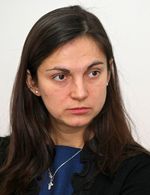 Hanna HOPKO: “We have what we deserve. I don’t think society is mature enough to rally together. And at this moment, even if we had a united Euromaidan-based political force, it would not save the situation.
Hanna HOPKO: “We have what we deserve. I don’t think society is mature enough to rally together. And at this moment, even if we had a united Euromaidan-based political force, it would not save the situation.
“Certain people were not prepared for unity. And Oleksandr’s arguments are quite solid. There are very many motives for an excuse. But, speaking of these elections, we must say that the authorities are trying hard in this transitional period to freeze any new approaches to shaping a new quality of politics. We can see clearly now how important it is for the old political system to freeze what the Maidan fought for and what the east is fighting for today.
“We also share responsibility for the destiny of Ukraine and the role it plays for the world. So, we will either move in a circle or make a quantum leap. To do so, each of us needs to bring our choice into line with our values and see to what extent they correlate.”
L.I.: “Viktoria, what is your opinion about why it failed? And, after all, what will this mean? What will be the consequences of the fact that young leaders are separate instead of being in a single political force?”
 Viktoria PODHORNA: “To tell the truth, what has happened now is superficial political structuring of society. I see no ‘root’ in this.
Viktoria PODHORNA: “To tell the truth, what has happened now is superficial political structuring of society. I see no ‘root’ in this.
“I highly respect the people who have come out of the Maidan, for they did very many useful things, but there is no what we call socioeconomic basis there. We are aware of why we do not want to see the old politics – we know what it is based on, Ukrainian politics is based on a well-built powerful oligarchic system which has cracked but not broken down completely. It will only break down when there emerges a true middle class – in the economic sense of the word. While small- and medium-scale businesses produce 70 to 80 percent of GDP worldwide, they do not more than 20 percent in Ukraine.
“Until politics gives real economic results, restructuring will lead to a situation when people who came to politics from civil society will always feel weak. There will be never-ending attempts to buy and provoke them, to set all kinds of psychological traps for them. It will be very difficult for these people, for they will feel no consolidation.
“What is politics? It is, above all, representation of interests and ideas. Nobody is speaking about interests today. All public figures think they represent civil society as a whole. But there can be no unstructured interests. One should work with society on a systemic level. This is the main task for the young political forces.
“In reality, interests continue to get structured on an in-depth level even in the US. Unfortunately, this has not yet begun in this country. I am very much afraid that the Maidan may remain a superficial phenomenon. This upsurge embraced many people on the emotional level, but it should go deeper into more practical and structural processes. This is our objective, the objective of a new political class.
“Secondly, why did the people who represented the Maidan fail to rally together? There was neither a normal vision of Ukraine nor a certain integrated platform which could help people move on and be aware of what they are doing.
“Reforms are a topnotch thing, and the Reanimation Package of Reforms has done a lot of work in this field. But, unfortunately, this is not enough. For the agenda that Russia has ‘imposed’ on us is re-creation of a modern Ukrainian state and nation. It is our present-day agenda. In the 18th-century France, on the eve of the Great Bourgeois Revolution, tremendous intellectual work was done among the populace. This intellectual groundwork helped that revolution to win. For society was not exactly prepared for new reforms.
“We must redouble our efforts to implement all this.”
L.I.: “I fully share this point of view. In 1999, when we lost the elections, I came to the editorial office which a half of the team had already abandoned and those who stayed behind were waiting to be told whether or not Den would come out the next day. I said we would be dealing with society. But we have very few adepts to transmit these signals to other segments, and we badly needed that at least journalists and civil society understood what were are all talking about.
“For this reason, this series of roundtables is, after all, about intellectual rapprochement among the milieus. We are speaking about the Polish experience. The people who came to Solidarity had a common background. In Ukraine, too, a common background is in the making.
“And the woes that befell the Party of Regions revealed the ineptness and weakness of oligarchs in the domestic struggle. It is the Regionnaires to whom oligarchs have shifted the blame for all the problems in this country’s development and the condition in which it is now.”
WHAT ARE THE FIRST BILLS YOU ARE GOING TO VOTE FOR IN PARLIAMENT?
Alla DUBROVYK: “It seems to me that, before working out an ideologem, one should first understand what a ‘country’ is and know it better. I visited a very interesting conference two weeks ago. There was a well-known expert there, who had consulted the governments of 60 countries. In my view, he applied the best ever figurative image to the process of reforms. In his words, to carry out reforms is the same as to prepare a salad. When we come to a Ukrainian restaurant, we are served a Ukrainian salad made of Ukrainian ingredients in Ukrainian proportions. When we come to a Malaysian restaurant, we are served a salad made of Malaysian foodstuffs and in Malaysian proportions – but still it is a salad.
“I have a question to the people running for parliamentary seats. Suppose there are three draft laws in your basket. Do you know the components of the Ukrainian salad and the proportions in which you will mix them?”
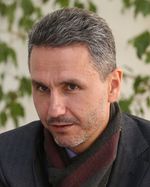 Hennadii DRUZENKO: “I like this metaphor very much, although I am very skeptical of foreign consultants.
Hennadii DRUZENKO: “I like this metaphor very much, although I am very skeptical of foreign consultants.
“I do not think it is worthwhile to begin with laws. Laws do not work in Ukraine. The Dnieper Ukraine learned for 300 years how to dodge laws. These people treat laws on the level of alienation. Whoever practices jurisprudence and wants to earn big money knows that one should focus not on how to obey a law but on how to evade one. For this reason, the state, which has law-enforcement bodies, will always be at a loss. It may perhaps use the riot police, but even this no longer works.
“What is above all is the Constitution. Let us be frank: the 2006 Constitution was drawn up by foreign advisors who gave us an idiotic system that has glitches a priori. We have one car that has two steering wheels and two drivers. Prof. Roger Myerson recently said at the highest level that ours is one of the world’s stupidest constitutions, especially now: the premier, not the Cabinet, is in fact in charge of the economy and the reform council was formed, for some reason, by the president who also appoints governors. In what way can the premier pursue his policies? Not clear. Besides, there are mayors who are allegedly trying to obtain more powers…
“I think we should begin with the things Charles de Gaulle once began with. In his first 100 days he introduced a new constitution, and things went on smoothly. Before that, the Fourth Republic had been a mess that even Ukraine did not know.
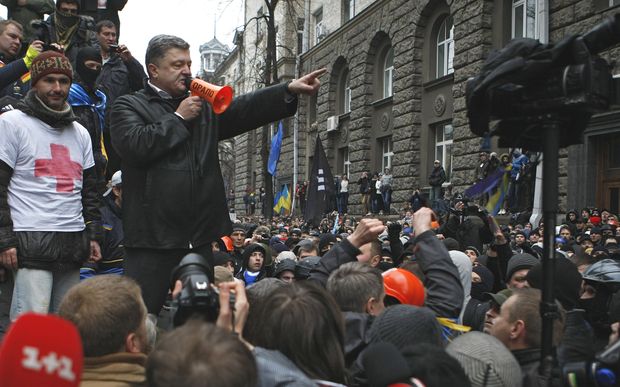
ALL THE PARTICIPANTS IN OUR ROUNDTABLE WERE EUROMAIDAN ACTIVISTS. SOME OF THEM EVEN PLAYED A KEY PART IN SOME OF ITS TURNING POINTS. ALL THIS IS SHOWN IN OUR NEW PHOTO ALBUM PEOPLE OF THE MAIDAN / Photo by Mykola TYMCHENKO, The Day
“Accordingly, we should change the system. And no matter what laws are inscribed into this system, they are sure to work. The Constitution is a key system. For we have made more than a fair share of mistakes in 23 years, and so we should be bursting, as the Americans are, to create something of our own. And, after the Maidan, I have no moral right not to suggest something of my own.”
L.I.: “A new system calls for relevant circumstances. Naturally, we want to have a de Gaulle, an Ataturk, or a Washington. But this is a passive wish. What has society done to have a Washington, an Ataturk, or a de Gaulle? So, it is no mere coincidence that it has what it has.
“We do not learn history. We do not know contemporary history. There’s nothing to speak about. I come to a classroom, where political science students and their teachers are sitting, and ask: ‘Under what circumstances did Ukraine drop the course towards NATO? What caused this U-turn?’ Pin-drop silence in response…Then I said they could consult their teachers. But nothing changed. I ask our journalists: ‘Were you taught this?’ For I am aware of different interpretations of this issue. I was a participant in this, while they were consumers of information. We are beginning very cautiously today to understand what has occurred in Ukraine in the 23 years of independence, where we are now, what urgent steps we can take, what we can offer people by way of draft laws, public initiative, the press, and untypical associations, in spite of belonging to different parties.
“In my opinion, these things are very topical today. For, one way or another, people are already looking at you. They have already seen and recognized you. They may also want to understand you. There is another, what I think important, reason of why you did not go together. Young people do not believe that society can trust the new and respond. In spite of such a nice thing as the Maidan, there is an effect of reciprocal mistrust. So, let us speak about this. Generally speaking, you are running for parliament because you want changes. How? What is to be done on what level?”
H.D.: “I think that in this case one must set precedents and alternatives instead of writing laws. There should be a factional debate. It should be shown that this is possible in Ukraine. What is one of the most hyped-up topics today? That everybody should cast a personal vote. But this is a very dubious claim. After all, it is more important what a button is being pushed for, not who is pushing it. It is important that a right decision should be made. And who will technically push the button is the 25th question.
“I think that if some of us or, God willing, all of us go through, we will be able to show that in Ukraine a fresh cucumber can remain fresh even after it has found itself in this preservation jar. This can really change more than the heaps of signed papers which will only bring new disappointments instead of changing anything. So, if we manage to create a new quality and show that all are not the same, this will be a tremendous step forward.”
O.S.: “The Constitution is on the first level and the decentralization package on the second one. It is a package, not just one law. It contains 17 laws – from administrative fee to the new wording of the law on police. For it is impossible to carry out decentralization by only amending the Constitution. In other words, this package, proposed by the president and ministers, includes three legislative acts. But they are incomplete. We also have two new versions of the budget and tax codes.
“I would also like to recall the thing we have discussed above – about representation of interests. We are very well aware that the party Syla Liudei represents entrepreneurs. They are the people who can give us money for the elections. Ordinary people cannot do so, for most of the individuals can only give 5 to 10 hryvnias. Via the Internet, people either give from 150 hryvnias upwards or nothing at all. So, we know who we represent and know that we need such a version of the budget and tax codes that will ‘multiply’ our voter – not the one the government registered on August 13. For, even though it is called part of the decentralization package, it will kill entrepreneurship. There will be no people left, who have an opportunity to earn money. This is why we need an alternative version. While we already have texts for the first (changes to the Constitution) and second (real decentralization) questions, Syla Liudei is still to write a text for the third one. We only have a concept so far. Yet we hope to have the text by the end of the elections.
“I will emphasize one important point: we would like to have not just any kind of decentralization but one that will help boost the number of owners and those who earn. Decentralization in itself is not needed, for it can even harm the country. We need decentralization in the field of money-earning. On the contrary, for example, in the field of health care, we need centralization. It is wrong that our city halls manage out-patient clinics and other health care facilities.”
L.I.: “It is also worthwhile to speak about the approaches of our parties to resolving the problems of eastern Ukraine and Crimea.”
O.S.: “It is written clearly in our party’s election program that we favor a worldwide movement for the return of Crimea. We want to launch a long-term movement as early as next month. And our party will be carrying out this project until we regain Crimea. The reason is that our entire Crimean organization has now left Crimea. One of our leaders, Andrii Shchykun, a Euromaidan coordinator, was bought out of captivity in exchange for three FSB officers.
“As far as the return of Crimea is concerned, we adhere to two conceptual points. Firstly, ‘not by war.’ How then? Via interaction with Crimean residents on the sociopolitical level. Secondly, it is ‘international community’ which is obliged to meet its commitments. We are unable to confront Russia on our own. Russia is trying to cause the world to first recognize de facto the occupation of Crimea and then forget about the Budapest Memorandum and other guarantees of global security. This must not be allowed to happen.
“As for the Donbas, we do not have any clear-cut position so far. There is only a position on the adopted law. Firstly, it will not work and, secondly, we have a version of the law that will work. We are prepared to move our draft law on special status of the Donbas in the first days of the newly-elected parliament’s session. This should not mean granting rights to those who have seized power there. In our opinion, all the oblast’s establishments and administrative bodies should be removed from the occupied territory, and the region should work in two modes at the same time – cross-border confrontation and basic development as part of Ukraine.”
H.H.” “Samopomich has tried to rally a lot of professional people around its platform and offer a new approach to politics. The list includes representatives of the political party Volia, the Reanimation Package of Reforms, and the xpert community. Although open lists have not been voted on in parliament, we have put them into practice by holding the first congress on September 9 and letting people assess the candidates. One candidate rejected his nomination.
“The next approach: yesterday we presented our program in Ukrainian House in the presence of about 500 people. Much to their surprise (people are not used to a party’s program being discussed in public), we were presenting what we consider important guidelines for two and a half hours, and people were not walking out. They evinced interest in what we proposed in the fields of security, defense, the economy, innovative technologies, the IT sector, the judicial system, education, medicine, and science.
“But, above all, parliament should regain certain prestige which will give this country a chance to serve interests. So, it is extremely important to show that there will be a team of people who have the experience of lawmaking and law advancement. This team has also a vision of what they are going to do.”
THE IDEOLOGEM OF NEW POLITICS: WHAT DOES IT RELY ON?
L.I.: “Deeds, deeds, and deeds again. I wrote in the preface to our new photo album People of the Maidan that I am against maidans as a way to address political problems. Naturally, when something has been amassing for 10 years and nobody is clearing it, nobody can be glad that he or she feels like vomiting. We must admit that we have a major problem, as far as human deeds and adherence to principles are concerned. But the media community is not paying attention to it and is unable to respond in time to the manifestations of a true civic stand. This is why we are then so much stunned by the mass-scale heroism of our soldiers in the east and by the Maidan, for that matter.
“Yes, we saw fantastic men, the heroism of Ukrainian volunteers, and the sympathy of medicine. We saw the part of a sound society, which knows that it is dangerous and people are dying there. But this is on the periphery, while in the middle of the country we can still see the same: a malignant neoplasm that hosts the same malign processes.
“Let me tell you an example. I asked a Montenegrin friend of mine: ‘You have little restaurants all over the place here. Do you have racket or bribery? Does anybody extort from you?’ He answered: ‘We would rather die than give a bribe.’ This is not the world’s most heroic nation, although, historically, it has examples of heroic struggle for its country, but they don’t even have an army of their own. But, on the everyday life level, they show daily readiness to perform deeds and live a normal life. In our country, this norm must pervade all the levels of society every day. And this heroism, which occurs once in ten years and which we are so much proud of, not without a reason, often shows just outwardly. For it is not a festive suit.”
H.H.: “In reality, I am convinced that we should not be proud of having had one Maidan after another. We must draw conclusions to avoid a third one. And whenever we speak about the new approaches that society needs, we do so to lay the groundwork which will make it impossible for the Kuchma-Yanukovych regime to stage a comeback. Another outbreak of a ‘revolution of dignity’ will mean that we have lost the ‘revolution of effectiveness.’”
Ivan KAPSAMUN: “In my view, the election law has become a test for public activists and society. People failed to persuade politicians to accept new rules. This means that old politicians will go on developing their system, while the new ones are not yet mature enough to change it. Each of the public activists has become part of a certain political force, a part of the old system and politics. Should the new politicians be getting to parliament together with the old ones, will there be any mechanisms to break this system? In what way will the new forces unite in parliament?”
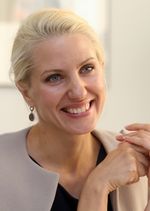 Svitlana ZALISHCHUK: “The election system itself changes nothing – it is a utopia. There are a lot of election system patterns, which work differently in different countries. In our country, this change and the advent of new people will occur when rules change not only with respect to open lists because the latter would produce very few changes. What we need is budgetary funding, transparency, accountancy, and a changed culture of voters so that they could make use of all this.
Svitlana ZALISHCHUK: “The election system itself changes nothing – it is a utopia. There are a lot of election system patterns, which work differently in different countries. In our country, this change and the advent of new people will occur when rules change not only with respect to open lists because the latter would produce very few changes. What we need is budgetary funding, transparency, accountancy, and a changed culture of voters so that they could make use of all this.
“Hennadii said there should be an alternative in order to cultivate trust. If young politicians do not become part of the old system but become this alternative and offer competition to the old system – in or out of parliament, – society will appreciate this. It is important to work not only on laws and texts, but also with people. For an election system to function, one must travel all over the country and explain to people why it is needed, how it can work, what their responsibility is, etc.
“But it is very important that young politicians do not ape the political forces they work with. I think it is possible if we are wise and restrain our ambitions. They can begin with a new inter-factional association which can work successfully in parliament.”

